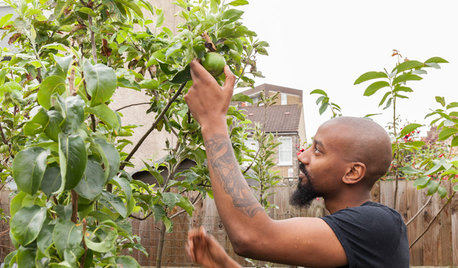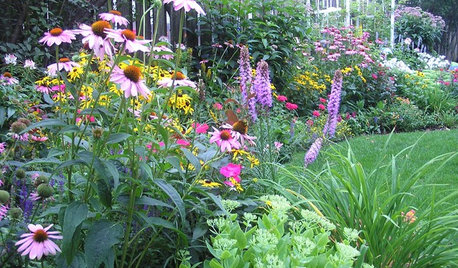windfall of composted manure
rdgardener
11 years ago
Related Stories

GARDENING GUIDESThe Poop Scoop: Enrich Your Soil With Good Old Manure
Get over the ick factor already — this natural super-ingredient for soil has so many benefits, you'll wonder why you ever went chemical
Full Story
GARDENING GUIDESGet on a Composting Kick (Hello, Free Fertilizer!)
Quit shelling out for pricey substitutes that aren’t even as good. Here’s how to give your soil the best while lightening your trash load
Full Story
GARDENING GUIDESHouzz TV: Make a Worm Bin for Rich Soil and Happy Plants
A worm-powered compost bin that can fit under a sink turns food scraps into a powerful amendment for your garden. Here’s how to make one
Full Story
GARDENING GUIDESLush, Foodie Abundance in a Small Urban Garden
This modest backyard garden provides its owner with fruit and vegetables all year round, thanks to an innovative low-maintenance approach
Full Story
EARTH DAYThe Case for Losing the Traditional Lawn
Work less, help the environment and foster connections by just saying no to typical turf
Full Story
LANDSCAPE DESIGNTry Slow Gardening for Some Unexpected Benefits
Why set your garden on the fast track? Here's how to relax and enjoy it in an entirely new way
Full Story
GARDENING GUIDESGardening Solutions for Heavy Clay Soils
What’s a gardener to do with soil that’s easily compacted and has poor drainage? Find out here
Full Story
GARDENING GUIDESNew Ways to Think About All That Mulch in the Garden
Before you go making a mountain out of a mulch hill, learn the facts about what your plants and soil really want
Full Story
FARM YOUR YARDHow to Get Good Soil for Your Edible Garden
The nutrients in your soil feed the plants that feed you. Here are tips on getting it right — just in time for planting season
Full Story
FARM YOUR YARDHow to Grow Vegetables in Containers
Get glorious vegetables and fruits on your patio with a pro’s guidance — including his personal recipe for potting mix
Full StorySponsored
Columbus Area's Luxury Design Build Firm | 17x Best of Houzz Winner!
More Discussions






slowpoke_gardener
Okiedawn OK Zone 7
Related Professionals
Grand Haven Landscape Architects & Landscape Designers · Middletown Landscape Contractors · Darien Landscape Contractors · Hawaii Landscape Contractors · Hendersonville Landscape Contractors · Lancaster Landscape Contractors · Setauket-East Setauket Landscape Contractors · South Farmingdale Landscape Contractors · West Orange Landscape Contractors · Maple Heights Landscape Contractors · Dayton Decks, Patios & Outdoor Enclosures · Frederick Decks, Patios & Outdoor Enclosures · Monroe Decks, Patios & Outdoor Enclosures · Statesville Decks, Patios & Outdoor Enclosures · Waukesha Decks, Patios & Outdoor Enclosuresshankins123
Okiedawn OK Zone 7
rdgardenerOriginal Author